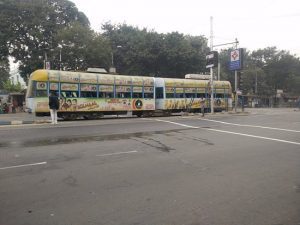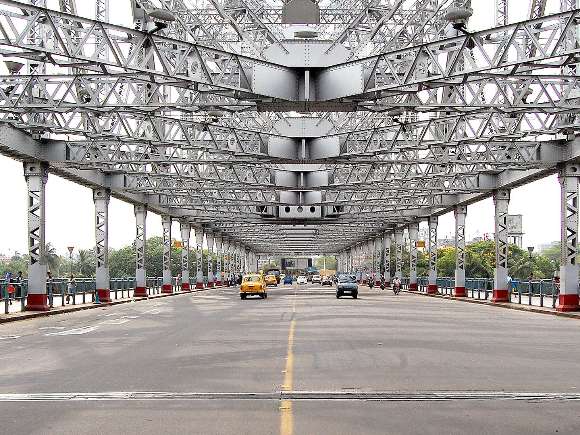Soumya tells us how he ventured out despite a bandh call in Kolkata and the woes he faced. An exclusive for Different Truths.
 My hometown, Kolkata, has always been known for its volatile politics, often expressed through marches, gheraos, dharnas and bandhs. As a school boy, we enjoyed the numerous holidays these gave us.
My hometown, Kolkata, has always been known for its volatile politics, often expressed through marches, gheraos, dharnas and bandhs. As a school boy, we enjoyed the numerous holidays these gave us.
I had been away from Kolkata for almost two decades and when I went back to the city in the late nineties, I had forgotten about the all-powerful Bangla bandh. Having worked in the capital, we knew that a strike called, or a bandh meant that shops would be closed but business went on as usual and government offices had to be opened, as otherwise it would be construed that we are supporting the bandh. Attendance, therefore, on bandh days were maximum as no leave was sanctioned except in emergencies.
When bandh call was given by one of the opposition parties in Bengal, I told my staff to ensure that the office would be opened, and their presence was compulsory.
So, when bandh call was given by one of the opposition parties in Bengal, I told my staff to ensure that the office would be opened, and their presence was compulsory. This was met with disbelief, and after much argument, a few officers, who lived within walking distance agreed to come, and one of them agreed to unlock the office in my presence if I would be able to reach there. They also persuaded me not to take out my car, and to wear casuals so as to avoid looking like an officer goer.
Next day, I was treated to a long-forgotten sight; that of completely deserted roads, devoid of any transport, public or private, and cricket matches going on in the erstwhile busy highways.
The driver confirmed that he would go up to the business district where my office was but added an enigmatic, ‘if we are able to’.
It was too eerie to take out my car, so I walked down these roads turned into  playing fields; to a street where trams plied. The state government who owned the tramways had declared that the trams would be running. After a while, a single tram made an appearance and I was the lone passenger. The driver confirmed that he would go up to the business district where my office was but added an enigmatic, ‘if we are able to’.
playing fields; to a street where trams plied. The state government who owned the tramways had declared that the trams would be running. After a while, a single tram made an appearance and I was the lone passenger. The driver confirmed that he would go up to the business district where my office was but added an enigmatic, ‘if we are able to’.
The tram rattled on down the empty street, and for a while and I enjoyed the ride as if it was my personal carrier, taking in the interesting architecture of this 300-year-old city, which was rarely visible on the normal overcrowded days.
A mob entered the tram and manhandled the elderly conductor and driver…
Suddenly, there was a rude shock of bricks hitting the tram and slogans being shouted, while we came to a jarring halt. A mob entered the tram and manhandled the elderly conductor and driver, while I looked helplessly on, paralyzed by fear. But as I saw someone sprinkling petrol on the seats, I was galvanised into action and jumped off the tram to rush headlong into a nearby lane.
I could see my erstwhile transport engulfed in flames from the lane and could hear the battle cries of the party calling the bandh, which propelled me further into the maze of lanes, where I had taken shelter.
From there, I called my colleague, who was waiting outside the office in casuals and described my state. He was surprised that I had reached this far unmolested and asked me to read out any street sign I could see. When I found one and relayed the address to him, he urged me to immediately leave the area and guided me along the now desolate main roads with the burning tram in the middle, until I reached familiar landmarks and found my way to the office.
…the streets where I had sought shelter from the rioters was equally fraught with danger of a different kind, as it was the local red-light district
 He explained to me that the streets where I had sought shelter from the rioters was equally fraught with danger of a different kind, as it was the local red-light district, and I could have been mistaken for an early customer.
He explained to me that the streets where I had sought shelter from the rioters was equally fraught with danger of a different kind, as it was the local red-light district, and I could have been mistaken for an early customer.
Relieved at yet another narrow escape of a different kind and traumatised with the whole experience I gave up all the ideas of opening of offices and decided to follow the local custom of taking a paid holiday whenever any strike or bandh call was given.
…soon an ambulance appeared; which was one of the classes of vehicles exempt from the bandh. The others were fire engines, TV News vans and hearses.
But the question remained that having reached office how I would get back home. It was too far to walk, and the occasional police vehicles seemed to be the only available transport. But one of my colleagues came to the rescue. He made a few calls and soon an ambulance appeared; which was one of the classes of vehicles exempt from the bandh. The others were fire engines, TV News vans and hearses. He had called a hospital associated with our organisation who kindly sent us an ambulance to transport me home.
Sitting on a stretcher in a speeding ambulance, smelling of disinfectants, I was consoling myself that this would be better than travelling in a hearse or under police escort, although a fire engine would have been more glamorous.
When the ambulance arrived home, my family was in a panic.
When the ambulance arrived home, my family was in a panic. They had been  persuading me not to venture out on such a day. Their worst fears seemed to have been turned into reality. As I came out of the ambulance on my own feet and reassured them of my wellbeing, I thought of how much worse it would have been if the hearse or police vehicle had been my transport.
persuading me not to venture out on such a day. Their worst fears seemed to have been turned into reality. As I came out of the ambulance on my own feet and reassured them of my wellbeing, I thought of how much worse it would have been if the hearse or police vehicle had been my transport.
For the rest of the time I worked in my hometown, I stayed firmly away from work whenever there was a strike or bandh call even by a party having single digit members.
©Soumya Mukherjee
Photos from the Internet





 By
By
 By
By
 By
By
 By
By